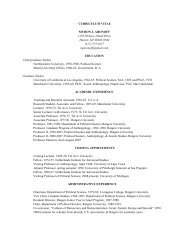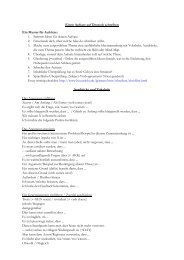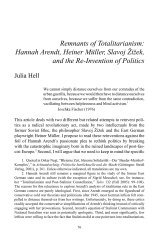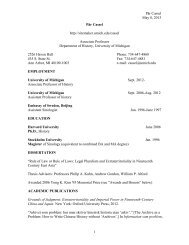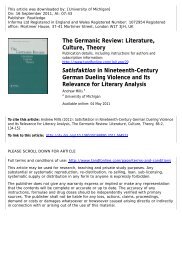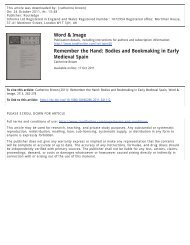Making History Personal: Constantine Cavafy and the Rise of Rome
Making History Personal: Constantine Cavafy and the Rise of Rome
Making History Personal: Constantine Cavafy and the Rise of Rome
Create successful ePaper yourself
Turn your PDF publications into a flip-book with our unique Google optimized e-Paper software.
Frier, “<strong>Making</strong> <strong>History</strong> <strong>Personal</strong>,” page 31<br />
None<strong>the</strong>less, <strong>the</strong> transfer <strong>of</strong> such yearning to a virtually unknown historical figure is a far<br />
more arresting instance <strong>of</strong> “erotic archaeology.” As Edmund Keeley observes, 101<br />
The poem has a double thrust in its re-creation <strong>of</strong> history: <strong>the</strong> poet’s attempt to so-<br />
licit sympathy for this doomed—<strong>and</strong> generally ignored—victim <strong>of</strong> a political “progress”<br />
beyond his control, <strong>and</strong> <strong>the</strong> poet’s implicit statement about <strong>the</strong> characterization <strong>of</strong> <strong>the</strong><br />
Ptolemies that he discovers in <strong>the</strong> inscriptions mentioned in <strong>the</strong> opening stanza. The evo-<br />
cation <strong>of</strong> Kaisarion’s pa<strong>the</strong>tic last hours—signalling <strong>the</strong> cruel end <strong>of</strong> <strong>the</strong> Ptolemaic line—<br />
in effect places <strong>the</strong> unreservedly glorified history <strong>of</strong> <strong>the</strong> inscriptions in proper perspec-<br />
tive.<br />
This is helpful in refocusing our attention not only on <strong>the</strong> more general structure <strong>of</strong> <strong>the</strong> poem it-<br />
self, but also on its broader relationship to <strong>the</strong> history <strong>of</strong> <strong>the</strong> Ptolemies <strong>and</strong> on <strong>the</strong> “moral” that<br />
<strong>Cavafy</strong> wished to draw from that history.<br />
But Keeley may be less convincing when he goes on to claim that: “it is <strong>the</strong> poet’s in-<br />
tense personalization <strong>of</strong> his historical material that dominates <strong>the</strong> poem, excessively for some<br />
tastes, since <strong>the</strong> rhetoric is colored not so much by <strong>the</strong> pathos <strong>of</strong> Kaisarion’s predicament as by<br />
<strong>the</strong> poet’s uninhibited involvement in his late evening vision.” At any rate, this may miss Cava-<br />
fy’s more subtle point. With “Caesarion,” as ten years previously with “Orophernes” <strong>and</strong> <strong>the</strong><br />
decay <strong>of</strong> <strong>the</strong> Seleucid dynasty, <strong>Cavafy</strong> evidently associates his own preoccupations as a homo-<br />
sexual poet with his perception <strong>of</strong> how <strong>the</strong> Hellenistic world was politically marginalized as a<br />
result <strong>of</strong> Roman conquest. There is, he implies, or at least suggests, a broad parallel between<br />
<strong>the</strong>se disparate phenomena, one that he can <strong>the</strong>n use in order to bring his own marginalized sex-<br />
ual persona into alliance with his marginalized social <strong>and</strong> political persona. 102<br />
cates, <strong>the</strong> result may not be to every reader’s taste, but that is ano<strong>the</strong>r matter entirely.<br />
As Keeley indi-<br />
At long last, in <strong>the</strong> poems <strong>of</strong> <strong>Cavafy</strong>, <strong>the</strong>re comes a moment where <strong>the</strong> recollections (or<br />
pseudo-recollections) <strong>of</strong> his poetic persona meld almost seamlessly with <strong>the</strong> records (or pseudo-<br />
records) <strong>of</strong> historical figures, notwithst<strong>and</strong>ing <strong>the</strong> disparity between <strong>the</strong> two genres in subject,<br />
101 Keeley, Alex<strong>and</strong>ria (1976) 96-97.<br />
102 See Jusdanis, Poetics (1987) 104-110, on marginality as essential to <strong>Cavafy</strong>’s modernism.






